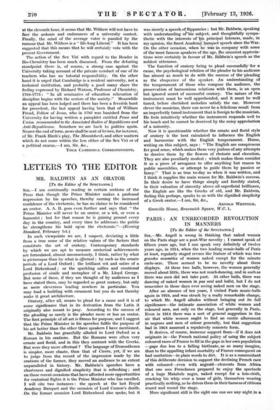LETTERS TO THE EDITOR
MR, BALDWIN AS AN ORATOR
[To the Editor of the SPECTATOR.]
Sra,—I am continually reading in certain sections of the Press that though the Prime Minister makes a profound impression by his speeches, thereby earning the increased confidence of the electorate, he has no claims to be considered an orator. A. A. B. goes even further and says that "the Prime Minister will never be an orator, or a wit, or even a humorist ; but for that reason he is gaining ground every day in the country, and every time he addresses the public he strengthens his hold upon the electorate."—(Evening Standard, February 1st.) In such viewpoints we are, I suspect, deviating a little from a true sense of the relative values of the factors that constitute the art of oratory. Contemporary standards by which we are apt to measure oratorical achievements are formulated, almost unconsciously, I think, rather by what is picturesque than by what is effectual ; by such as the ornate periods of a Lord Oxford ; the brilliant wit and satire of a Lord Birkenhead ; or the sparkling sallies and emotional profusion of simile and metaphor of a Mr. Lloyd George. But none of these, if they are thought of by audiences as I have stated them, may be regarded as great oratory, but only as mere cleverness leading nowhere in particular. You may load a building with ornament but you do not thereby make it great architecture.
Oratory, after all, means to plead for a cause and it is of some significance that in its derivation from the Latin it originally also meant to pray. According to the success of the pleading so surely is the pleader more or less an orator. The first principle of all art is fitness for purpose, and I suggest that the Prime Minister in his speeches fulfils the purpose of his art better than the other three speakers I have mentioned. " Mr. Baldwin has gracefully alluded to Lord Oxford as a Roman in his orations. But the Romans were often very ornate and florid, and in this they contrast with the Greeks. But were they more effectual ? The language of Demosthenes is simpler, more chaste, than that of Cicero, yet, if we are to judge from the record of the impression made by the orations of the former, they moved an audience to an extent unparalleled in history. Mr. Baldwin's speeches have a chasteness and dignified simplicity that is refreshing ; and on those recent occasions that have afforded more opportunities for oratorical flights it is the Prime Minister who has excelled. I will cite two instances : the speech at the last Royal Academy Banquet and the occasion of Lord Curzon's death. On the former occasion Lord- Birkenhead also spoke, but it was merely a speech of flippancies ; but Mr. Baldwin, speaking with understanding ohis subject, and thoughtfully sympa- thetic with the interests of -tis principal listeners, made, in my opinion, the finest Academy banquet speech since the War. On the other occasion, when• he wins in company with some of the Most famous speakers of the age, the sincerest appiecia- tions were certainly in favour of Mr. Bdwin's speech as the noblest utterance.
The function of oratory being to plead successfully for a cause, the psychological relation of the pleader to his audience has almost as much to do with the success of the pleading as the eloquence of the speaker. An understanding of the temperament of those who compose the audience, the preservation of harmonious relations with them, is an open but ignored secret of successful oratory. The nature of the instrument must be well apprehended, and it must be well tuned, before cherished melodies satisfy the ear. However clever the musician, there can never be a felicitous result from an imperfectly tuned instrument that is foreign to the musician. He feels intuitively whether the instrument responds well to his touch and he cannot be deceived by the noisy approbation of a minority.
Now it is questionable whether the ornate and florid style of oratory is the best calculated to influence the English and harmonize with the English temperament. Hume, writing on this subject, says : "The English are conspicuous for good sense, which makes them very jealous of any attempts to deceive them by the flowers of rhetoric and elocution. They are also peculiarly modest ; which makes them consider it as a piece of arrogance to offer anything but reason to public assemblies, or attempt to guide them by passion or fancy." That is as true to-day as when it was written, and I think it supplies the main reason for Mr. Baldwin's success. In their desire to have things simply and forcibly stated, in their valuation of sincerity above all superficial brilliance, the English are like the Greeks of old, and Mr. Baldwin, feeling this perhaps, speaks to us with the dignified simplicity of a Greek orator.—I am, Sir, &c.,


















































 Previous page
Previous page